Like many authors of genre fiction, George R.R. Martin famously advises wannabe writers to read as much as possible in ALL genres, not just SFF. We think that’s just fine, because as many have pointed out before (including this very blog), fans of science fiction and fantasy are often extremely well read in other genres, too. Because Tor.com explores the universe and related subjects, we are always dedicated to highlighting all sorts of writing. From Jo Walton’s rereads of the wonderful Patrick O’Brian novels, to Sarah Monette’s musing on Ellery Queen, to the recent addition of Ryan Britt’s Genre in the Mainstream series, it’s pretty clear we love various genres.
Today we asked our ever-vigilant Facebook and Twitter followers to tell us which non-SFF books they love. We also threw a little bit of a curve ball with this one by qualifying the question to include books that “sort of feel like SFF.” This might have been a tricky one, but you rose to the challenge!
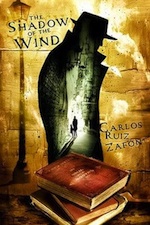 The Shadow of the Wind by Carlos Ruiz Zafon
The Shadow of the Wind by Carlos Ruiz Zafon
We love books that love books and it doesn’t get more bookish than a novel about a mysterious book and the cast of nefarious characters that surround it. Part Gothic, part old-fashion mystery, this novel accomplishes what we love about the best stories: it’s a crackerjack of a book, yet deeply literary.
* * *
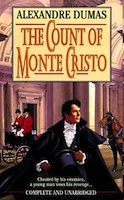 The Count of Monte Cristo by Alexandre Dumas
The Count of Monte Cristo by Alexandre Dumas
Loosely based on an actual historical figure, this tale of buried treasure, betrayal and secret identities, seems stuck in the shadow of Dumas’s other masterpiece; The Three Musketeers. No fair! We definitely think this one deserves a second or third read.
* * *
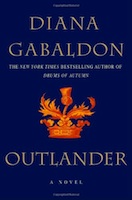 Outlander series by Diana Gabaldon
Outlander series by Diana Gabaldon
This one is a no-brainer. While not marketed as SFF, the protagonist of this series; Claire Beauchamp Randall, becomes an unwitting time traveler in the very first book. Coming from WWII all the way to the 1700s of Scotland definitely has some SFF cred with us. Also, before paranormal romance became huge, Gabaldon was there first.
* * *
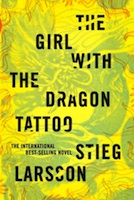 The Girl with the Dragon Tattoo by Stieg Larsson
The Girl with the Dragon Tattoo by Stieg Larsson
We’ve certainly made the argument here before that certain elements of crime fiction have science fictional aspects. Cop shows that feature forensic “science” being used in a fictional way spring to mind. And the girl herself, Lisbeth Salander certainly possesses some larger than life skills. Espionage and hacking plots are not necessarily science fiction, but we think they grew up in the same house.
* * *
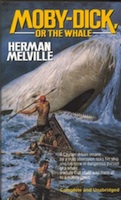 Moby Dick by Herman Melville
Moby Dick by Herman Melville
From Battlestar Galactica’s Starbuck to Khan’s climatic death scene, the sheer amounts of references Moby Dick has in various popular forms of science fiction alone should be enough to explain why SFF fans love this classic novel. But really, we think it might have something to do with the fact that’s it’s basically about a giant monster.
* * *
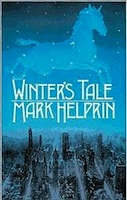 Winter’s Tale by Mark Helprin
Winter’s Tale by Mark Helprin
Taking place in what can only be described as an alternate reality version of New York City, this novel has enough magical realism and fantasy to make any reader of genre fiction happy. And it’s an extremely touching read.
* * *
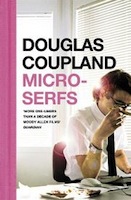 Microserfs by Douglas Coupland
Microserfs by Douglas Coupland
Referencing the various happenings of the technology industry BEFORE the dotcom boom, this novel is told exclusively via diary entries on a 1990’s era-laptop. Emoticons were new back then, meaning if a time traveler from the 1960’s were to pick up this book, it would probably seem like science fiction.
* * *
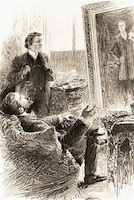 Picture of Dorian Grey by Oscar Wilde
Picture of Dorian Grey by Oscar Wilde
Morrissey famously crooned that Wilde was on his side in the Smith’s song “Cemetery Gates” and we couldn’t agree more. If you could insert your soul into your own self-portrait, would you? It’s like this was the original Twilight Zone premise. Why was Oscar Wilde so damn good?
One final note for now: as many of our readers are aware: everyone at Tor.com LOVES Sherlock Holmes. Except for that one guy. He knows who he is.
Thanks so much to ALL our Facebook and Twitter people for your responses!
Stubby the Rocket is the voice and mascot of Tor.com. Everything kind of looks like SFF to it.










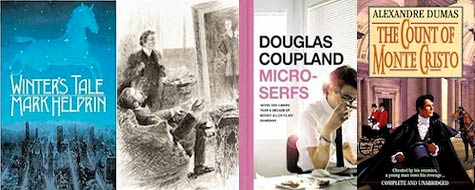
The non-SFF book that I love the best is Shogun, by James Clavell. It’s the historical epic, and is the kind of epic-length tale that I’d love to write someday. I’ve also seen a lot of other SFF fans reading it, so it’s probably a good thing to add to the list. Plus: it contains ninjas.
So “non-SFF” means, for many people, “F”, huh?
I think Ninjas qualify both as Fantastical and Science Fictional. They don’t have to actually be either to qualify as both, because…
…they’re ninjas.
I think the qualifier might have given some folks permission to cross the line into the fantastic. It is sometimes a vague boundary (since all literature is in some sense fantasy), but most of these titles strike me as border-dwellers at the very least.
I would recommend Marilynne Robinson’s Housekeeping, for sure, because its strangeness is quietly anchored yet unsettling . Also books like Arundhati Roy’s God of Small Things or Margaret Atwood’s Surfacing, books that re-envision the world and challenge your idea of how it works. Steinbeck’s Cannery Row and Joyce’s “The Dead” for their clarity and vitality.
Some non-SFF books I love to read are:
Godel, Escher, Bach: an Eternal Golden Braid, by Douglas Hofstadter.
The Emperor’s New Mind, by Sir Roger Penrose.
The Selfish Gene, by Richard Dawkins.
I’ve had Mark Helprin’s Winter’s Tale on loan from a friend for… oh, about 7 years now. I guess I should actually get around to reading it one of these days!
Daydreamer: You should read it! If I had one book for life it might be Winters Tale.
There’s a triumverate of authors that I think fit well together, and run a spectrum of SFF to non-SFF as you move through it:
F Paul Wilson – especially the Repairman Jack books
Joe R Lansdale – His horror fits genre, but Hap and Leonard don’t
Andrew Vacchs – The Burke books are defintely not SFF, but would appeal to anyone whose enjoyed FPW and JRL.
Always Nabokov, here. I’d recommend Ada for fans of the “trainwreck writing, BUT SO BEAUTIFUL” genre. Pale Fire is for those, um…not quite ready to put up with that, i.e. most folk.
Sarah Waters is my recent favorite, tho’. I just popped onto my Kindle to see what I’ve read in the past three months that wasn’t some form of SFF. That was her work, and Laura Miller’s Magician’s Book.
I second Pale FIRE
I liked “the confessions” by John Grisham
I forget who wrote it but there’s a book call “The real Charlie Chan which was about the real man Charlie Chan was REALLY LOSELY based on.
also I REALLY liked Keith Richard’s AUTObio “Life”
Went to check the online library catalog for The Shadow of the Wind and there are multiple holds on next returned copies. For a 10 year old book! That is a major recommendation.
I like Moby Dick myself, but I’ve noticed some readers are disconcerted by the many chapters spent talking about whales and life on 19th-century whalers, with nary a plot development in sight. It might appeal more to SFF readers if they go in thinking of it as an exercise in worldbuilding.
Russian novels have a dour reputation, but many are compulsively readable. Dostoevsky’s Crime and Punishment is not only a great novel, but one of the most suspenseful thrillers ever, and I’d recommend The Master and Margarita by Mikhail Bulgakov to any fantasy fan.
Franz Kafka is another classic writer who’s more fun than his reputation suggests–and also funnier, though not in the “jokes with punch lines” sense.
The NYRB Classics series is a good place to find interesting non-SFF books–almost every book of theirs I’ve tried has turned out to be to my taste. (And many of them I’d selected fairly randomly.)
Peter Dickinson may fall outside the outside the genre limits for some works but any that fall inside the outside the genre limits will none the less feel like they fall into the SFF genre. The awards as for instance for Skin Deep/Glass Sided Ants Nest imply a firm grounding in other genres despite such reviews as:…
…..
@12: Melville is also funnier than some people may realize. I think this is one of the best extended puns ever:
“Why it is that all Merchant-seamen, and also all Pirates and
Man-of-War’s men, and Slave-ship sailors, cherish such a scornful
feeling towards Whale-ships; this is a question it would be hard to
answer. Because, in the case of pirates, say, I should like to know
whether that profession of theirs has any peculiar glory about it. It
sometimes ends in uncommon elevation, indeed; but only at the gallows. And besides, when a man is elevated in that odd fashion, he has no proper foundation for his superior altitude. Hence, I conclude, that in boasting himself to be high lifted above a whaleman, in that assertion the pirate has no solid basis to stand on.”
I’d love to see a list of primarily non-fiction books that SFF fans like. I’ve just finished reading Kenan Malik’s Strange Fruit: Why Both Sides are Wrong in the Race Debate, and it rocked my world. Makes me want to look twice at all the fetishizing of “peoples” and “cultures” in fantasy novels.
Great post “Stubby”! Thanks for a couple new ideas for good reads.
Paradise Lost is a must.
Mine has got to be The Name of the Rose, which is way too metafictional to be a historical novel, and yet not nearly weird enough to be sf.
The Sand Pebbles by Richard McKenna. A historical novel about American sailors in China in the 1920s, you can tell that it was by a science fiction writer, just by the way it deals with the culture clash.
McKenna published this in 1962, then died in 1964 — aged 51 — leaving his second novel unfinished. His story “The Secret Place” won one of the first Nebula Awards in 1966.
Shogun, Name of the Rose, the Patrick O’Brian novels, The Count of Monte Cristo, The Girl With the Dragon Tattoo, and Microserfs are all winners. When I originally read Shogun I remember noticing that I liked it for many of the same reasons I like SF.
I would also recommend October Sky by Hickam, The Making of the Atomic Bomb by Rhodes, Soul of a New Machine by Kidder and any of the George Smiley books by Le Carre.
October Sky could almost have been written by Heinlein as one of his juveniles – but better.
The books by Rhodes and Kidder are dramatic and true stories of important engineering projects and the people, scientists and engineers, who undertook them. The Kidder book is smaller, more intimate story, but both are wonderful. In fact, my description does not do either book justice.
I am not really sure the Smiley books meet the criteria of “feeling sort of like SF”. But they are smart spy/thrillers with an edge and a heart and a healthy dose of moral ambiguity. And they made me think more than any other books in that genre.
Er, isn’t it The Picture of Dorian Gray?
(I’m a librarian… worse, a cataloguer…)
I see Dostoevsky got mentioned above, so just had to mention my favorite of his, and one of my all-time favorite books – The Brothers Karamazov. I don’t think this is really related to SFF in any way…but I’m a SFF fan and I love it! Also, Sherlock Holmes is awesome.
The Counte of Monte Cristo remains my favorite book to read. No matter how many times I’ve read LOTR or TWOT, I will read “Monte Cristo” at least once a year. :)
I would add The Easy Rawlins Mysteries by Walter Mosely
+ would (What If?: The World’s Foremost Military Historians Imagine What Might Have Been by Robert Cowley) be consired non scifi/fantasy?
Dorothy Dunnetts Lymond Chronicles or House of Niccolo. For charasmatic heros, depth and detail of plotting and sheer geographic scale they beat virtualy everything else. Well worth a prolonged reread.
Worldbuilding is key in all of the nonSFF works. That’s why we like them, from Aubrey/Maturin to Microserfs.
– Note: Gabaldon is sci fi. Historical sci-fi, but sci fi to the same extent as Connie Willis. She is excellent but shouldn’t be in this discussion at all.
– second the Name of the Rose. Also Foucault’s Pendulum, which more or less can be considered Sci Fi. Umberto Eco is delightfully off-kilter.
– second Shogun and all the Clavell oeuvre. Compulsively readable.
– second Kidder’s Soul of a New Machine and, indeed, anything by Kidder. He’s one of those guys who takes a seemingly dry subject matter (development of a new computer; life in an inner city school) and makes it epic. His National Book Award-winning book House is probably my favorite nonfiction book of all time – a lawyer gets land from adjoining his wife’s family, hires an architect of stellar reputation within a firm who has gone out on his own as the designer of his dream house, and hires a group of craftspeople to get it built. Kidder tells the story from all sides. Marvelous. Epic.
– Anything by James Gleick – Chaos, the Making of a New Science; Genius (a biography of the physicist Richard Feynmann), his new book The Information. Science made fun and thoughtful.
– Anything by Ben Mezrich, especially Burning Down the House (made into the movie 21) and the Accidental Billionaires (made into the movie The Social Network). Fun, fictionalized nonfiction.
Rob
Hilary Mantel’s novels are well worth reading, Wolf Hall in particular is a stunning historical novel. many SF&F readers I know get on very well with her work.
I recently finished Shadow of the Wind. It was quite good, but I felt like it was missing something, maybe not quite enough magical realism or too much. Well worth reading though.
I would add the works of George MacDonald Fraser to the list. Flashman isn’t to everyone’s taste, but the Macauslan stories or Pyrates should be enjoyable for most people.
@Ada Thanks for mentioning Nabakov! I think THE REAL LIFE OF SEBASTIAN KNIGHT is my favorite of his. So awesome.
I love participating in these Facebook questions. It is fun to see how my experiences jive with others.
Aside from Dumas, I would add Eiji Yoshikawa’s Musashi as a favorite. If you have any interest in Warring States period Japan, it is an amazing read.
I love LOTR, Pern, WoT, ASoIaF, and all the other great series out there. However, the books I reread with a passion are The Count of Monte Cristo and Musashi. Even after so many rereads they never get stale.
Thinking about this, I realized that I very rarely read any fiction other than SF. I concur with Shogun and much prefer The Three Musketeers over The Count of Monte Cristo, but on the whole I find my personal library bereft of non-SF novels. What I do read, instead, is a wide variety of non-fiction, mostly in the categories of science, business, history (particularly ancient history) and religion.
@Daedelus- Thank you! That’s why we do these things!
I’d like to suggest Arturo Perez-Reverte. His Captain Alatriste books make me think of both Dumas and Patrick O’Brian. And I’ve enjoyed everything of his that I’ve read, including several which have fantastic elements (not saying which books, as that represents a bit of a spoiler).
I second #25 beerofthedark’s rec of Hilary Mantel. I just finished Rothfuss’s The Name of the Wind, and for some reason it gave me such a flashback to Wolf Hall — which is not a fantasy at all, but a similarly engrossing and sophisticated character study.
Some non-fiction books I’ve loved that could very loosely fit into this discussion include:
– “History of the World in Six Glasses” By Tom Standage
– “A Voyage Long and Strange” by Tony Horwitz (for that matter, “Confederates in the Attic” is nearly surreal enough to be SF) “Blue Latitudes” is fantastic too.
– “1491” by Charles Mann
– “Washington’s Spies” by Alex Rose.
Not sure they count as non-fiction, but books by Graham Hancock are certainly speculative.
William Gaddis !
A novel that is in no way SF or fantasy and yet tends to be loved by SF fans (me included): Dodie Smith’s I Capture the Castle. Jo Walton wrote it up for us nearly three years ago. If you haven’t read it — run, don’t walk, etc.
Also, not technically novels, but the great John McPhee’s book-length examinations of this or that subject — geology, oranges, Alaska, New Jersey’s Pine Barrens, shad, Switzerland, experimental airships, Bill Bradley’s basketball career, the Merchant Marine, farmers’ markets, freight transportation, and lots more — often prove fascinating to people who love SF.
McPhee is fascinated with the how the world works in a way that’s not dissimilar to the fascination that powers a lot of science fiction.
Georgette Heyer, passim.
Patrick O’Brian, ditto.
Neal Stevenson’s ‘Cryptomonicon’ if you discount Enoch Root.
Carsten Jensen’s ‘We the Drowned’ (Three generations of a Danish sailing family).
Dumas’ entire D’Artagnan saga. (Three Musketeers, 20 years after, !0 years later, The man in the iron mask)
Victor Hugo’s ‘Les Miserables’. even better than the musical.
‘Revolution’ by Jennifer Donelley though it does have some weird coincedences that might be linked to Fantasy.
@skylark
Ohhh… I completely forgot about Victor Hugo. I read that book over a decade ago, I suppose I am due for a return to it.
As for Stevenson, I enjoyed Cryptonomicon, but it felt like a literary wrapper for an “Intro to Crypto” course. I liked learning about the theory of cryptology, but it seemed to jar with the tension and pacing of the story. I think he did much better introducing concepts of programming in Diamond Age.
I love my thrillers, frequently simple sketches of characters, barely any fleshing out of backstory but one heck of a ride.
Good examples would be –
Clive Cussler, particularly earlier works like Night Probe or Treasure.
David Morrell, especially First Blood and The Brotherhood of the Rose
Alistair Maclean – HMS Ulysses is a brilliant piece of writing.
Plus Hammond Innes or John Buchan, Robert Ludlum or Frederick Forsyth.
Many of them get sneered upon by critics, same as our favourite Genre books do, but there is a reason they become best sellers.
@37 PNH:
Thanks, I want to check that one out. I’ve paddled around it a bit. It’s an amazing place.
Even though they really are not science fiction, The Series of Unfortunate Events books are amazing and feel like some sort of steam punk world. ALSO, Daniel Handler’s (Lemony Snicket) novel Adverbs is awesome. Talk about some magical realism
Spy fiction often seems to pop up with SFF fans as well. My personal likes, Len Deighton’s first four ‘unnamed narrator’ novels (The Ipcress File, Horse Under Water, Funeral in Berlin & Billion Dollar Brain). Others I adore include
I, Claudius Robert Graves
Greenvoe, Magnus & Vinland George Mackay Brown
The Cruel Sea Nicholas Monsarrat
Dorothy L Sayers’ Lord Peter Wimsey mysteries
And my personal favourite, R L Stevenson, particularly Treasure Island, Kidnapped and The Master of Ballantrae
I can’t agree enough with F Paul Wilson’s Repairman Jack & Adversary series’. They are a great mix of horror, mystery and action.
Pardieu – I’m actually re-reading the Count at this very moment (for the first time since fourth grade.) I had forgotten quite how hefty it was… I think Jordan was a Dumas fan.
+1 for The Count of Monte Cristo. Robin Buss’ translation for the Penguin Classics edition is a must-have. If you haven’t read it or have only read the old public domain translation (or worst of all, one of the abridged versions), you really owe it to yourself to get that one. Not only is the translation great, but it’s packed with supplemental material (e.g. footnotes for translation nuances, references to explain the history of Napoleon and 19th century politics) that really enhance the enjoyment of the story.
Similarly, I have a version of Moby Dick that basically has the equivalent of Cliff’s Notes built-in, pointing out the very heavy symbolism throughout and giving modern terms for the words that have either lost or changed meaning by now. Unfortunately I can’t remember what version it is and I can’t seem to find a picture of it online.
Oh, and +1 for Shogun too. :)
I think SFF readers are generally fans of science, too, especially space science. I guess I don’t need to tell that to Tor.com though, since there is the occasional, entirely nonfiction, space-related post here.
Modern crime dramas are like science fiction. It’s always hilarious to see their forensic teams able to take a webcam image and zoom in to outrageous magnification, and do things like change the angle. And there is the classic CSI quote, “I’ll create a GUI interface using Visual Basic, see if I can track an IP address.”
The Count of Monte Cristo is by far my favorite book.
I would also echo R.L. Stevenson and add Rudyard Kipling.
@41 I would agree with thrillers and am glad to see another
Alistair Maclean fan.
Another favorite is Rafael Sabatini – Captain Blood, Scaramouche and Bellarion are amazing characters.
G.K. Chesteron’s tales verge on the fantastic — The Man who Was Thursday and The Napoleon of Notting Hill are just two examples that take you on a wild ride.
Finally I am surprised no one has mentioned Charles Dickens — A Tale of Two Cities, Bleak House and Oliver Twist being among my favorites.
If you like I Capture the Castle, you should also try Cold Comfort Farm.
Alastair MacLean! Add me onto the pile. I read them all when they came out. (Very fond of Where Eagles Dare.)
John McPhee. I’ve read nearly everything he has written. Still get shivers in the Curve of Binding Energy when he discusses how relatively easy it would be to deliver a small nuke to the Prudential Center in Boston or the World Trade Towers in NYC. Yikes. My favorites are some of his shorter pieces – Brigade de Cuisine: about an unnamed genius chef with a restaurant less than an hour from downtown Manhattan; and the piece where he goes on a winter canoeing trip with Euell Gibbons (remember him from Grape Nuts commercials in the States!), lives off the land, and ends up gaining weight. Again, worldbuilding!!
Rob
Something non-fiction: “Strange Angel: The Otherworldly Life of Rocket Scientist John Whiteside Parsons” by George Pendle. The intersection of the founder of the Jet Propulsion Laboratory, Alastair Crowley, L Ron Hubbard, LASFS, and then some weird stuff.
I’m not sure that it relates to SFF, but I’ve been getting into Yasunari Kawabata recently. Master of Go and Snow Country are great, though I think the former is the better of the two. His flash fiction collection, Palm-of-the-Hand Stories, is also great. It’s all so beautiful, even in translation.
Fiction I haven’t seen mentioned yet:
The Amazing Adventures of Kavalier & Clay – Michael Chabon The Plague – Albert Camus
The Terror and Drood – Dan Simmons
Perfume: The Story of a Murderer – Patrick Suskind
Non-fiction:
The Lost City of Z – David Grann
Put me down for Winter’s Tale, the only book that ever made me want to live in a city.
More recently, I really enjoyed Strange Adventures in Calamity Physics by Pessl. First, it has physics in the title. Second, the main character is quite nerdy amongst her avant-garde social clique, rife with murder and espionage.
I almost forgot to mention
“Captain Blood” by Rafael Sabatinini, also one of my favorites of non scifi/fantasy :)
She wanders back and forth over the line of “fantasy” in places, but Joanne Harris writes with real beauty and warmth. Start with Chocolat (yes, this is the book the film was based on. And it’s even better.)
Barbara Kingsolver has a sense of place and landscape that a lot of SFF authors could learn from. The Poisonwood Bible and her non-fiction auto-bio work Animal, Vegetable, Miracle are excellent.
Fans of Pratchett will appreciate P.G. Wodehouse’s humor and madcap adventures. If you’ve ever wondered where “Ask Jeeves” came from, look no farther than the Jeeves and Wooster series.
Virgina Woolf plays with gender-swapping and time-travel in Orlando, which is a really fun, romping tour of a completely brilliant mind. A very good introduction to the rest of her oeuvre.
Seconding Paradise Lost and Hilary Mantel.
If anything could be said of reading out of the SFF genre, then reading the Classics should be said the loudest and the strongest. There are more than shades of Dickens in The Clockwork Century (at least by my reading, YMMV). Reading Wells should be more than just a dig into Steampunk foundations. Any worldbuilding activity could be achieved by a study of his History of the World and ‘forking-alts’ to the heart’s content. You want the words of mighty war time leaders? Churchill. And just to round it all out, Mark Hodder has given us a great re-working of conservative philosopher Edward Spenser; he seems to prefer living on the street.
Fortress of Solitude by Johanthan Laatham
Call of the Wild. It has frontier exploration, technology, world building. The story gets into the dog’s mind, which is non-human. There is are even some supernatural elements to the story.
Also, Tom Sawyer, Huck Finn, Connecticutt Yankee
I cannot agree more with The Count of Monte Cristo.
I got a large (but still abridged!) copy from B&N about 5 years ago, and about a year ago I picked up the aforementioned unabridged Penguin classics version.
I liked the movie with Jim Cavezil, though they Hollywood-ized the story. And the experiment anime sci-fi that was loosely based on it, Gankutsuou.
Also agree with The Call of the Wild (and White Fang).
Pride and Prejudice anyone?
Almost anything by Nevil Shute.
NOW PLAYING AT CANTERBURY by Vance Bourjaily.
@62 – I’ll second P and P and Persuasion. Jane Austen FTW!
Rob
Thanks for so many interesting recommendations.
Some of my favorites include:
– Firedrake’s Eye by Patricia Finney – excellent historical fiction, interesting POV (narrated by a madman out of Bedlam).
– A Prayer for Owen Meaney by John Irving – quirkey, folksy drama with some very minor fantastical elements.
– Killer Angels by Michael Shaara – fascinating recounting of the Battle of Gettysburg
– The Roman Series (beginning with the First Man in Rome) by Colleen McCullough – amazing historical fiction focused on the last years of the Roman Republic and its transition to empire.
I’ll also second (or third…) a lot that were recommended above including:
Shogun
The Amazing Adventures of Kavalier and Clay
Cryptonomicom (Neal Stephenson is all-round amazing)
Poisonwood Bible
I Claudius
The Master and Margarita
Thanks again for the recommendations.
I’ll chime in with a “me too” on Georgette Heyer, Jane Austen, Sherlock Holmes, Dumas, and Sabatini.
Nobody’s mentioned Mary Renault, although Jo Walton has done some posts on her books here. Immersive historical fiction: The King Must Die, The Mask of Apollo, etc.
I’m also quite fond of Susan Howatch’s trilogy about a ministry of healing and deliverance within the Church of England, set in the 1990s I think: The Wonder Worker, The High Flyer, and the Heartbreaker. There are fantastic elements in them, but they’re certainly not presented as genre. Strong Christian religious themes, so not for those who wouldn’t enjoy that, but I don’t find them preachy. They are sequels of a sort to an earlier set of books of hers, which I like, but not as well.
1. Folk tales. Lots of “what if” happening there. I own a short book with tales from all over the world that’s one of my favourites. Also, Portuguese folk tales are great too, with talking monkeys and corn-sized kids. Also, the Arabian Nights.
2. Children’s books. If you have kids in your life don’t miss out on some great stories. My favourite is probably The Gruffalo—shaping reality with your words is definitely Fantasy.
3. Mythology. The Edda, Kalevala and such. The Odyssey. Sumerian tales.
4. The Bible, or parts of it. There’s something for the SFF fan in stories of heartless prophets being swallowed by gigantic fishes. The apocalyptic prophecies are very bizarre: Revelation, Ezekiel, Daniel. Also, much of the texts have layers of meaning and the whole book benefits from a reread. You read the same book of the Bible twice and you notice things you hadn’t seen the first time. Was this already here, or…? The feeling you’re rewriting the text, or that meaning is blossoming under your eyes, is very SFF to me. Finally, good understanding requires contextualizing the writings so much you practically have to transform yourself into the original reader.
A lot of my favorites have been mentioned, especially the Master and Margarita.
I’ll add all of david Mitchell’s books, especially Cloud Atlas.
The Modesty Blaise series.
Infinite Jest
Gravity’s Rainbow and V by Pynchon.
The Bangkok 8 series by John Burdette, about a Buddhist police detective in Bangkok.
LeCarre, Dickens, Melville are all great.
Peter Ackroyd: Chatterton, The House of Doctor Dee, The Last Will and Testament of Oscar Wilde, and most particularly, Hawksmoor.
Patricia Highsmith’s Ripley series.
Dorothy Sayers’ Peter Wimsey books, particularly Murder Must Advertise.
Jack O’Connell.
Geoff Nicholson, who is very funny, particularly What We Did on Our Holidays.
John Buchan’s The Courts of the Morning, a very strange revolution in an imaginary South American country. Lots of other Buchan books too, like Greenmantle (WWI spies).
The Prisoner of Zenda, and then read Royal Flash, MacDonald’s parody of Zenda with Flashman.
Anything by Peter Dickinson — some fantasy, but the alt-history murder mysteries like The Glass-Sided Ants’ Nest and King and Joker, and the book about our primitive homo sapiens ancestors, The Kin.
o John Maddox Roberts’ SPQR series of detective novels set in the last years of Republican Rome.
o Second on Kipling: a number of his stories qualify as F or SF, but also because there was never anyone better at choosing just the right word or at creating a feeling of knowingness, even when talking about a “healer of pearls” and never stopping to explain or say “as you know, Bob.”
o I saw The Napoleon of Notting Hill mentioned. It has one of the most delicious openings: “The human race, to which many of my readers belong….”
o The Geographer’s Library and The Rule of Four were also good and with a touch of strange. I have a soft spot for “lost history” stories.
o For non-novels, The Passing of the Modern Age by John Lukacs because it’s not often you get a book that looks backward to the Modern Ages and their collapse.
o Of course, I also like books like Deming’s The Statistical Adjustment of Data, so we had better not go there.
o I had enjoyed The Selfish Gene rather well before I read Mary Midgley’s The Myths We Live By and other essays. Now I cannot read it with a straight face.
The Name of the Rose is a great suggestion.
What about Robert Harris’s counterfactual novels – Fatherland and Archangel? I’m not a huge fan of any of the rest of his books, but they were pretty good, and pretty sci-fi-y in feel, I would suggest.
For the most part, though, the not-sci-fi I read, is errr, not science fictional at all.
Like Water for Chocolate by Laura Esquivel
Hullabaloo in the Guava Orchard by Kiran Desai
Italo Calvino writes some dreamlike stuff ad some very grounded stuff. I’m always recommending The Nonexistent Knight and The Baron in the Trees. Both start off with hilarious absurdity and then turn hopeless, though. Calvino was an existentialist.
Any of the Dortmunder series of books by Donald Westlake. The author wrote his famously hardboiled Parker tales under the pseudonym Richard Stark. His funnier capers were for Dortmunder, though. The first tale is The Hot Rock.
Man, now I have to go compile a shopping list. Folks here have suggested some good stuff.
Some interesting suggestions, and themes/talking points. There are several things named that have been on my to-be-read pile for ages, and a few more that are now on my list. I “second” adventure classics like Sabatini, Dumas, London, Kipling, and Doyle, and would add Orczy. I also second Sayers, plus Heyer and Austen, tho’ the “SF-ish” aspect is tenous there.
I missed this post when it first popped up, somehow.
Anyway, I”m a huge John Steinbeck fan. East of Eden, The Grapes of Wrath, The Pearl…those were probably my three favorites.
Les Miserables by Victor Hugo, as someone else mentioned a while back, is also pretty high on my list.
And I can’t forget Harper Lee’s To Kill a Mockingbird.
As a kid, before I even got into SFF, I was a huge fan of Agatha Christie.